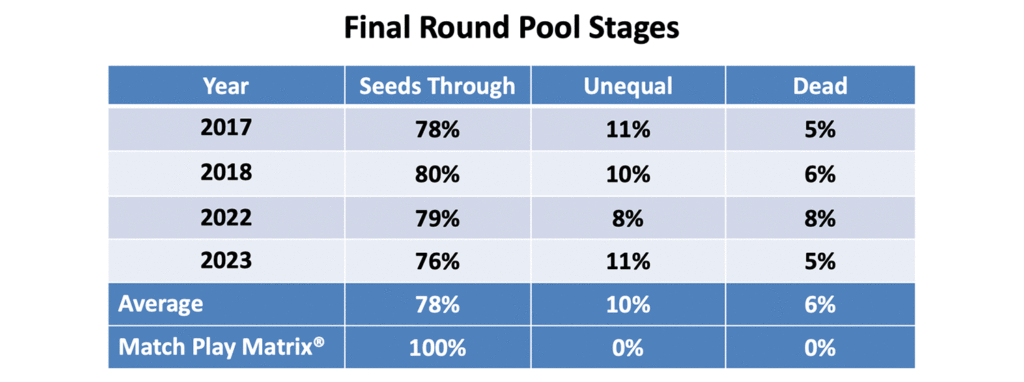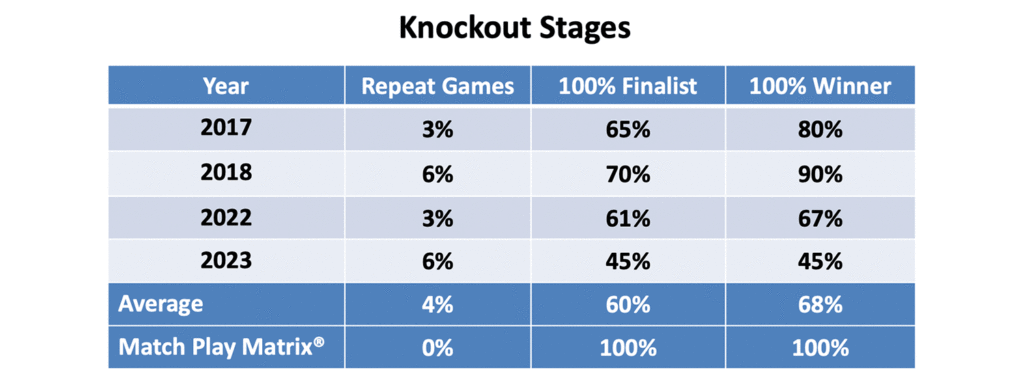

World Rugby Sevens Fixtures On Repeat
Knockout events for teams create that win or go home mentality that brings out the best in international team sport.
However when you have a global series of rugby match play team events there needs to be a safety net for the players and teams to justify the commercial objective of the participating teams.
Here is how the HSBC World Sevens tried to solve the knockout problem with group stages.
Getting To Sweet Sixteen
The HSBC World Sevens Series ran from 1999 to 2023 when it was rebranded to SVNS, but under the same sponsor.
It comprises core rugby teams which since 2012/23 numbered 15 teams with a 16th team promoted or relegated from the tier 2 nations. This gave the draw a round number of 16 teams which were divided into 4 groups of 4 teams, with the top 2 teams in each group proceeding to an 8 team knockout.
The remaining 8 teams and those that lost in the subsequent matches of the main draw continued to play against each other to create a series of playoffs for 3rd, 5th, 9th, and 13th places. Whilst this created more games it did restrict teams to a maximum and minimum finishing position.
No Safety For Seeds
The group stages also did little to ensure the seeds made the main knockout as on average only 78% qualified from the group stages.
Uneven Games Create Inequality
In the final round of group games there were 1 to 2 games per tournament (6% of all group games) on average that were dead games where neither team could qualify for the main draw.
Unequal games, where one team could advance and one could not, accounted for 10% of all group games or 2-3 games per tournament.
There are only 8 games per round so the proportion of games that would be of interest to the neutral spectator is even higher.

Two From Four Creates Repeats
Generally each group had two seeded teams that would be expected to go through and therefore the games against the lower ranked teams in the group tend to be one-sided. Hence why interest in the group games on the first day of the two day tournament tended to be lower.
However the key difference to the group stages employed by the WGC World Match Play Golf was that two teams qualified in each group. This creates the possibility of repeat fixtures and in the 4 series from 2017 to 2023 there averaged at least 1 repeat game per tournament.
In certain tournaments such as London and Vancouver in 2023 there were 3 repeat fixtures in the final rounds. This means that in 6 games per team at the tournament, 2 of those were against the same side.

Losers Can Be Winners
The other major drawback of group stages is that the winning team does not need to win every game. Over 40 tournaments played between 2017 and 2023, only 60% of the finalists and 68% of the winners had a 100% record.
In 2023 the average was even lower with only 4 winners of the 11 tournaments having a 100% record.
Meaningless Games Reduces Player Welfare
In terms of player load, the maximum number of games is 6 per tournament and most of the core seeded teams averaged 5.6 games per tournament. Many of these would be meaningless and take up valuable pitch time that could have been used to run women or tier two events at the same time.
Unique Fixtures & 100% Champions
The Match Play Matrix® format would solve all these issues. An event for 16 teams guarantees 4 games per team which reduces player load and solves all of the issues associated with group stages because:
- every player plays every round.
- every game is equal between two teams with the same win ratio.
- the winner is the last team left with a 100% record.
- you can never play the same opponent twice.




